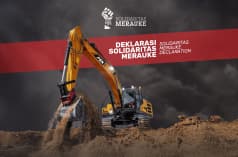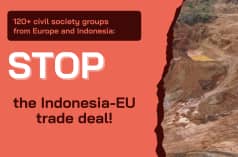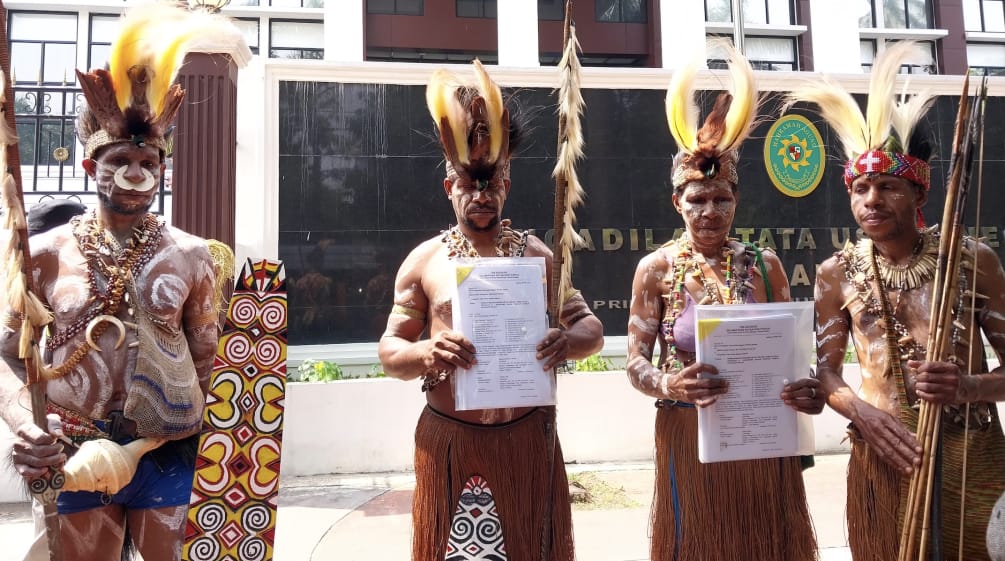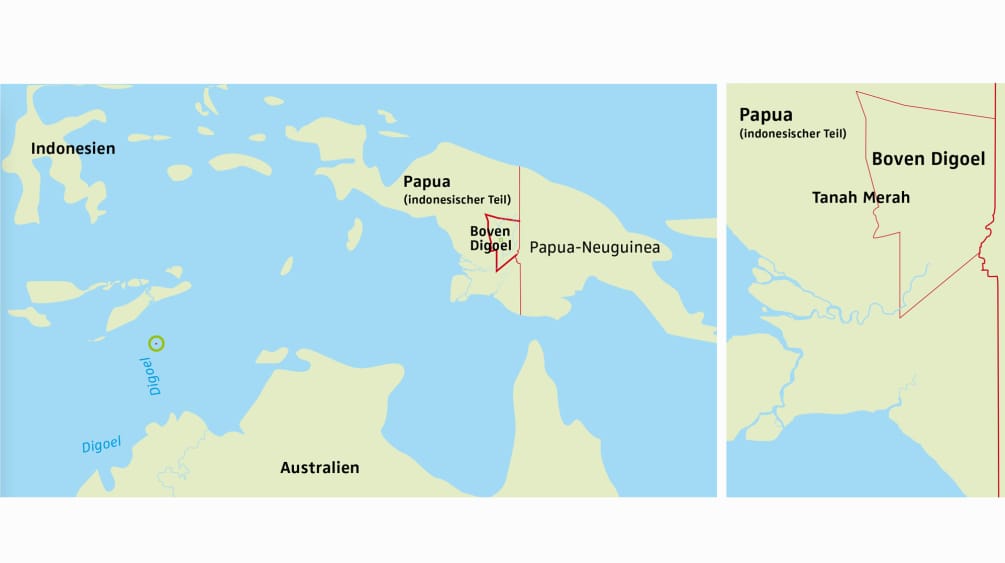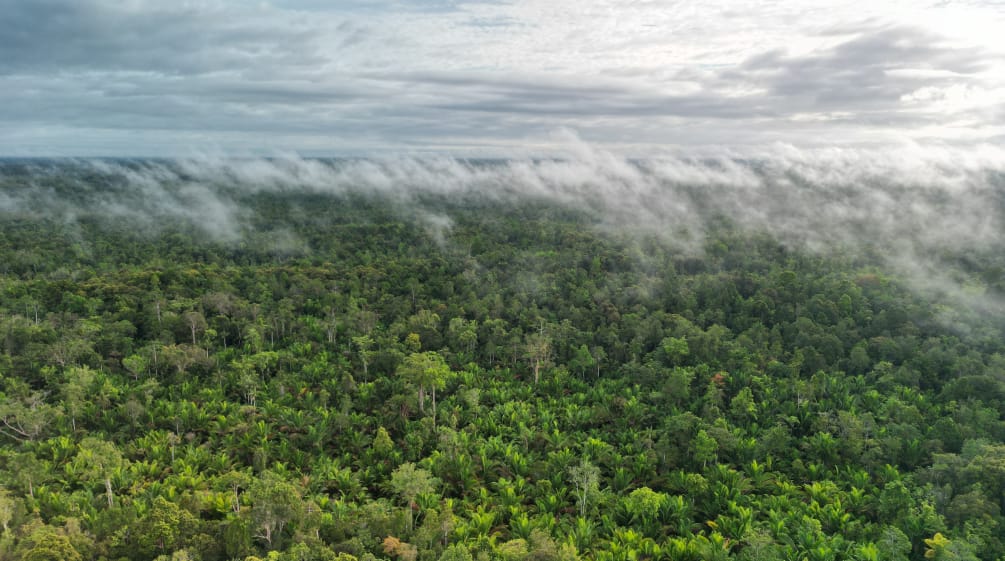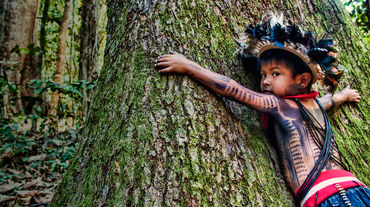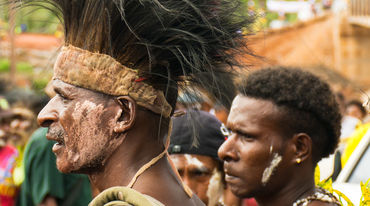Court ruling endangers Awyu forest in Papua
Nov 24, 2023
The Indigenous Awyu people of Papua are fighting for their forest in court. Their lawsuit against a license granted for an oil palm plantation was rejected by a court in Jayapura. However, buoyed by worldwide solidarity, Awyu elder Hendrikus Woro is appealing.
“In dubio pro natura”: Scientists, environmentalists, the Indonesian Commission on Human Rights and Papuan NGOs have called on the court to rule on this legal principle. It should thus consider Indigenous rights, environmental protection and the climate crisis “to ensure the continued existence of the forest as a source of life for Indigenous Papuans.”
Hendrikus Woro, an Indigenous man from the Awyu people, filed an environmental and climate lawsuit in March 2023. The proceedings – on which nothing less than the preservation of the forest of Papua, the Indonesian part of the island of New Guinea, hinges – lasted seven months.
Hendrikus Woro sued over the granting of an environmental permit for an oil palm plantation owned by the company Indo Asiana Lestari. 36,000 hectares of Awyu rainforest and dry forest were to be cut down without their consent. And all this in one of the largest and densest forests in Southeast Asia, home to tree kangaroos and birds of paradise.
The wave of solidarity for the Awyu was overwhelming: 259 international organizations, including Rainforest Rescue, and even numerous Indigenous Ka’apor from the distant Amazon region appealed to the court. You can read an excerpt from our solidarity letter to the court below.
On November 2, the court dismissed the case. “The judge’s decision sends a bad signal and is a setback for environmental protection and for the Awyu Indigenous people, who are fighting to protect their traditional forest from the threat of deforestation by oil palm companies,” said a representative of Pusaka, our partner organization.
The court based its ruling on a single letter from an organization that neither represents the Awyu nor has the right to release indigenous peoples’ forests for deforestation. “This ignores the principle of free, prior and informed consent of the affected communities,” said Tigor Hutapea of the Awyu’s legal team.
Hendrikus Woro is disappointed and saddened by the court’s unfair verdict, but he is determined not to let up in the fight for the peoples’ land and the environment. Emanuel Gobay of his legal team said: “We are appealing because the issue here is that the rights of the indigenous Papuans have been ignored and abused. The court ruling violates constitutionally guaranteed Indigenous and human rights.”
The environmental and climate lawsuit was based on two findings: Information is not public, neither about the companies and the licenses granted to them, nor about the location and size of the concession areas. Furthermore, the Indigenous people’s right to consent has been violated. In addition, the Awyu were not involved in the environmental impact assessment.
According to one of the legal representatives, “the court ignored the principle of ‘in dubio pro natura’. In other words, if the evidence is questionable, the court should give priority to protecting the environment.”
Two environmental organizations are appealing alongside Hendrikus Woro: our partners Pusaka and WALHI Papua, because “these proceedings are crucial for the future of the Papuan rainforest, which is the source of life for the indigenous Papuans”.
Background
We have been calling attention to the planned mega-clearcut for palm oil since 2020, specifically with regard to the dubious permits for the Tanah Merah project, the world’s largest oil palm plantation covering 280,000 hectares of intact rainforest and dry forest in the district of Boven Digoel, South Papua. This is precisely the traditional land of the Awyu people.
In May 2023, we presented Hendrikus Woro as a witness in legal action by two companies against the Forestry Ministry in our update, Indonesia: violations of traditional forest rights in Papua. PT Megakarya Jaya Raya and PT Kartika Cipta Pratama had sued after the ministry had withdrawn their permits – an encouraging success in the wake of intensive campaigning by environmentalists. Of the 74,000 hectares of the concessions, the companies had already clear-cut 9,000. The appearance of the Awyu under the leadership of Hendrikus Woro in court in Jakarta aroused considerable attention.
Excerpt from the letter of solidarity to the administrative court in Jayapura
- We are submitting this open letter for the sake of justice of the environmental defender, Hendrikus Woro, who is fighting for the Woro Clan and Awyu Tribe, the Plaintiff in the environmental and climate change case Number 6/G/LH/2023/PTUN.JPR of the Jayapura State Administrative Court (PTUN). The lawsuit concerns an environmental permit issued by the Papua Province Investment and One-Stop Integrated Service Office for palm oil company PT Indo Asiana Lestari (PT IAL).
- That Hendrikus Woro as the plaintiff is the leader of the Woro clan, part of the Awyu tribe. The Woro clan lives in Yare Village, Fofi District, Boven Digoel. He filed this lawsuit because the local government allegedly withheld information about PT IAL's licences, whose concessions would annex their customary territory;
- That the environmental feasibility permit issued by the Papua Province Investment and One Stop Open Service Office for palm oil company PT Indo Asiana Lestari (PT IAL) is based on a problematic Environmental Impact Assessment (EIA), ignores the existence of indigenous peoples as customary territory owners, and is substantially flawed because it is not accompanied by a conservation analysis. So that it can potentially lead to environmental damage and loss of indigenous peoples' rights;
- That the issuance of PT IAL's environmental feasibility permit allegedly violates laws and regulations, namely Government Regulation Number 22 of 2021 concerning the preparation of EIA, and is contrary to Law Number 32/2009 concerning Environmental Protection and Management;
- PT IAL's environmental permit is expected to trigger deforestation in an area that is mostly primary dry forest covering 26,326 hectares. The granting of licences to palm oil companies is also not in line with the government's promise to tackle climate change. In the Enhanced Nationally Determined Contribution (ENDC), the government is committed to reducing greenhouse gas emissions by 31.89 per cent on its own and 43.20 per cent with international support by 2030.

